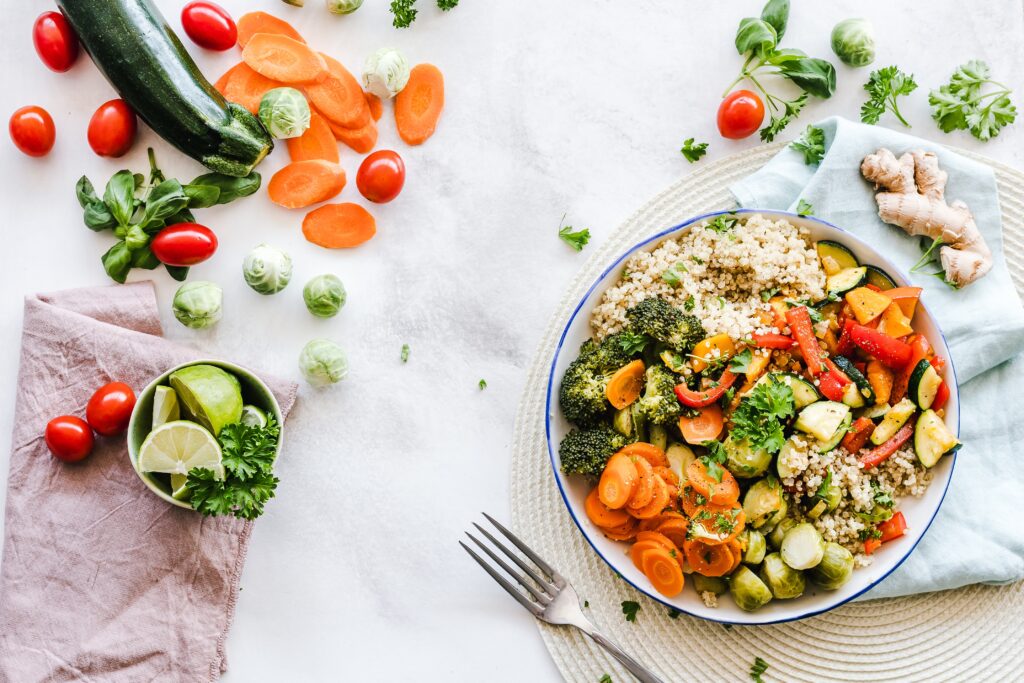October is Vegetarian Month! Here is the run down on vegetarian diets and important things to keep in mind for pregnancy, infants, and children.
There are many types of vegetarians. Lacto-ovo vegetarians do not eat meat, poultry, or seafood but will eat dairy and eggs. Pescatarians will eat seafood. Vegans do not eat any animal products including meat, poultry, seafood, dairy, and eggs. Others may not refer to themselves as vegetarian but still eat less animal foods than others. They may eat vegetarian most of the time, or one day per week, such as Meatless Mondays. A 2016 poll showed that about 3.3% of adults report never eating meat, fish, seafood, or poultry. Of these, about half report being vegan. People who are younger (18-34 years) and female are more likely to be a vegetarian.
There are many benefits to eating a vegetarian diet. Vegetarian diets can provide benefits such as reduced risk of heart disease, diabetes, high blood pressure, cancer, and obesity. Vegetarian diets can also be better for the environment because of their impact on use of natural resources.
Vegetarians of all ages should pay attention to these key nutrients:
- Protein: Amino Acids are the building blocks of protein. We all need certain amino acids in our diets. Plant-based foods may be low in certain amino acids. The key to making sure you get all amino acids the body needs is to eat a variety of plant-based sources of protein, such as beans, legumes, and soy products. For those who eat dairy and eggs, these are good sources of protein as well.
- The iron found in plant foods (beans, nuts, tofu, and darky leafy greens) is not as easily absorbed by the body. Eating a source of vitamin C, such as citrus fruits, alongside plant-based sources of iron will help with iron absorption. In addition, WIC participants can look to WIC approved cereals as good sources of iron.
- Calcium intake can also be low if you do not eat dairy. Like iron, plant sources of calcium are more difficult for the body to absorb. A diet that includes calcium-fortified plant-based milks, calcium-set tofu, and vegetable sources such as kale, turnip greens, Chinese cabbage, and bok choy, can help ensure you are getting enough calcium.
- Vitamin D is important for bone health and has many other roles in the body. We get Vitamin D from sun exposure and taking it in through foods and supplements. It can be found in milks and juices, cereals, and margarines with added Vitamin D.
- Most vegetarians will get vitamin B12 from supplements or foods that have been fortified because B12 is not found in plant foods. One egg and one cup of milk per day provides about 2/3 of the amount needed daily for adults.
Pregnant Women can also keep the following in mind:
- Protein needs in the 2nd and 3rd trimester are about 25 grams per day higher than they were prior to pregnancy.
- An iron supplement is usually recommended due to the possibility for poor intake and increased needs during pregnancy.
- Pregnant women have increased need for essential omega-3 fatty acids. Vegetarian sources of these include seeds (flax, chia, canola, hemp), walnuts, and their oils, or in supplements.
- For vegan women, iodine intake may be low if you do not consume iodized salt or sea vegetables. Pregnant women who are vegan may look for a multivitamin that contains iodine.
- Calcium needs are also increased during pregnancy. Look to the sources listed above to make sure you are getting enough if you do not eat dairy products.
Tips to keep in mind for children:
If feeding your infant a vegetarian diet, exclusive breastfeeding is recommended for the first 6 months of life. If formula is given, it should be a commercial cow’s milk or soy-based iron-fortified formula. Breast milk and formula both contain calcium. Once solid foods are introduced, regularly feed foods such as iron and zinc fortified infant cereal, hummus, tofu, legumes, and mashed avocado.
For vegetarian children, iron, zinc, vitamin B12, calcium, and vitamin D are all nutrients important for growth. It has been found that most vegetarian children eat enough protein, but they may have to eat slightly higher amounts of protein than non-vegetarian children.
Try this Pasta with Beans and Greens recipe from Cooking Matters for a quick vegetarian meal packed with protein and iron!
Sources:
